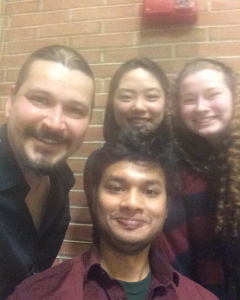
Developing a personal connection between teachers and students is a challenging task, especially in large college lecture courses. The classroom environment alone does not offer many opportunities for a one-on-one conversation between an instructor and a student, and I have learned that many students miss the teacher-student relationship that they got used to in high school.
As an instructor, I only have the opportunity to get to know my 400 students if they come to my office hours, enroll in one of my smaller courses, or are assigned to me as my advisees. Thankfully, Cornell offers other opportunities to connect to students outside of a classroom setting.
When I was the lecture assistant of the “old” biology course (Bio 101-104) back in 2007, the course instructor at that time was Prof. Cole Gilbert. Cole had organized weekly dining hall meetings where students who attended were free to talk about challenges they experienced in the course, pick Cole’s brain about natural history, or just have a casual conversation about life in general.
Based on that great experience, I applied to become a dining hall Fellow to carry on this tradition. I’ve started a weekly dining discussion with my students in the Investigative Biology class. We meet at the Robert Purcell Community Center Marketplace dining hall at 6.30pm every Wednesday, and dine in a reserved room (RPCC 222) so we can have uninterrupted conversations. It is great that Cornell offers this excellent opportunity to faculty. Ethan Stephenson, Associate Director of North Campus Faculty Programs (evs24@cornell.edu), provides 11 meals per week to the Fellows. That means I can invite laboratory instructors, undergraduate assistants, and pay for students who do not have a meal plan.
Dr. Deane-Coe and I have had fantastic conversations with the small group of attendees at these dinners. Students picked our brains about how we became scientists, talked about their own career paths, and we also discussed topics such as music and Eastern European history. Students also benefit from interacting with each other, for example finding out how they can play a grand piano for free on campus. Both students and instructors walked away from these dining discussions recharged and happy. One of the students sent me a thank you email last week saying:
“I had a really good time talking with you of just about anything.”
This student put her finger on the main point of these informal dining discussions. It is a fantastic feeling to get to know students, understand why they are here, how their life on campus is going, and show them through our personal examples that “It all will work out at the end”. It is an awesome program and I cannot wait for the next Wednesday evening! – Dr. Sarvary